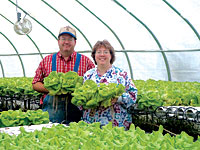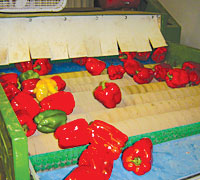In a world where imported products often seem more the rule than the exception, a group of Madison County growers and crafters is rowing against the tide. Under the banner of Madison Family Farms, these go-local activists are marketing homegrown produce and value-added products and forging links with local institutional buyers.

In the wake of the tobacco buyout, Dewain Mackey of Mackey Farms in Mars Hill became concerned that the one-two punch of fading farms and funding cuts might jeopardize the very existence of the Madison County Cooperative Extension service. Working with other concerned farmers, he urged the county Board of Commissioners to fund the purchase of land for a new extension office and a value-added center.
“Dewain was the pivotal person in getting commissioners to invest $800,000 in the future of agriculture in this county,” reports co-organizer Aubrey Raper of Rogue Harbor Farm in Marshall. With additional funding from the Golden LEAF Foundation and the Rural Internet Access Authority, Madison Family Farms was established three years ago.
Raper also credits Brenda Spence, child-nutrition director for the Madison County School System, as the nonprofit’s first institutional buyer. “It would never have happened without her enthusiastic support,” he notes.
Since 2004, the group has been busy seeking funding and overseeing the construction of a distribution facility. The new value-added center, which began operation last year, boasts a huge warehouse, cold storage, a washing-and-sorting line for produce, and a commercial kitchen. Meanwhile, the nonprofit has begun forging connections between local farms and markets. In addition to the county schools, Mars Hill College is also a customer.
But the group’s efforts don’t stop at the county line. The Mitchell and Yancey County school systems and the Asheville City Schools have all signed on as well. Mission Hospitals, meanwhile, has gone a step further, agreeing to label patient-menu options made with the nonprofit’s products as locally grown (and, where appropriate, organic). Greenlife Grocery also offers Madison Family Farms produce.

“We learned that local school systems were buying apples from Oregon and made a connection with Henderson County growers. Local apples are cheaper for the schools and support the local farm economy,” Raper told Xpress.
With 1,500 small family farms, Madison County is well-positioned to supply residents’ dietary needs, keeping consumer dollars in the local economy.
It all adds up
Adding value to basic commodities is a key component of the effort to boost the local farm economy. Marketing processed goods is a crucial piece of Madison Family Farms’ game plan.
Grower Sandy Smith of Sunset Valley Farm in Mars Hill, who’s been part of Madison Farms “since the beginning,” has headed up a project that creates gift boxes filled with local products. The wooden boxes contain varying combinations of jams, jellies, relishes and herb blends from Sunset Valley, honey from various sources, lotions and other spa products from Healing Hollow Herbals, and soap and pottery from Dancing Wood. The wooden spoons and honey dippers included in some boxes are the work of county resident Ray Kivett, and the boxes themselves are made by students in the Madison High School woodworking shop.
Together with Sara Hodge of Healing Hollow and Beth Herdman of Dancing Wood, Smith says she’s been refining the product. “It’s still a work in progress. We’ve used other producers for specialty boxes.” And though Greenlife Grocery offered the gift boxes during the holiday season, the group feels direct marketing may be its best route.
“Soon we’ll be dividing up the area and visiting potential outlets, and I intend to contact all of the area Realtors,” Smith explains. “Last year we had a large order from a Realtor who used it as the company’s holiday gift. It makes sense for someone whose business is with newcomers to give a local product instead of buying gift baskets from out of the region.”
In addition, notes Smith, “We’re about to update the Web site, so people can place orders directly there as well.”
The current product line includes cantaloupe, cherry tomatoes, slicing tomatoes, red cabbage, cucumbers, collards, squash, decorative pumpkins, watercress, potatoes, collards, turnips, year-round hydroponic lettuce, berries, peppers, grass-fed/grain-finished/antibiotic-free beef and pasture-raised pork, says Raper. The Easter freeze, however, put a serious dent in the early season offerings, he reports. “We expected to have a couple of hundred gallons of blueberries, but there weren’t any.”
Talking about Madison Family Farms, Greenlife Grocery co-owner John Swann told Xpress: “Regional food security is a growing issue for those of us who are concerned with transitioning to a sustainable future. Anything that improves the security and survival of local farms is good for the community—and good for us.”
For more information, visit www.madisonfarms.org or phone Dewain Mackey at 649-2411.



Before you comment
The comments section is here to provide a platform for civil dialogue on the issues we face together as a local community. Xpress is committed to offering this platform for all voices, but when the tone of the discussion gets nasty or strays off topic, we believe many people choose not to participate. Xpress editors are determined to moderate comments to ensure a constructive interchange is maintained. All comments judged not to be in keeping with the spirit of civil discourse will be removed and repeat violators will be banned. See here for our terms of service. Thank you for being part of this effort to promote respectful discussion.